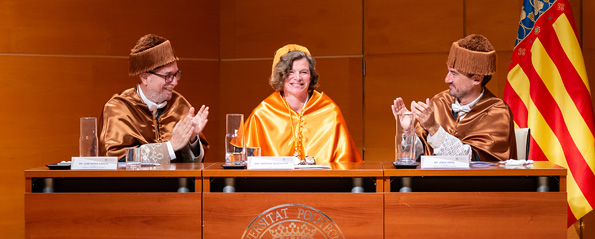Mariana Mazzucato, doctor honoris causa
"The climate problem is the result of the actions of the public and private sectors; the progress of history does not determine it".
[ 23/06/2023 ]
Mariana Mazzucato, one of the most influential economists of our time, has been awarded an honorary doctorate by the Universitat Politècnica de València, in the closing ceremony of the academic year 2022 - 2023 held today at the Vera campus. In her speech, the economist insisted on one of her main ideas: crises are the result of decisions and can be reversed. "The climate problem is the result of the actions of the public and private sectors; the progress of history does not determine it" she said.
For Mazzucato, the public sector is responsible for significant innovations and technological milestones, such as those that made the moon landing possible. In this sense, she affirmed that initiatives such as the European Next Generation funds represent a great opportunity, but that it is necessary for society to participate in decisions on the destination of investments. She also pointed out the serious crises facing human beings: climate, health, financial... "Faced with these crises we can become depressed, or we can choose to be positive and make decisions that will help us to improve". The economist has put València as an example: "I am proud to receive this recognition in this city, which is not lazy".
Acknowledgments
Mariana Mazzucato is the founding director of the Institute for Innovation and Public Purpose at University College London. She has received several international awards, including the Order of Merit of the Italian Republic in 2021 and the John von Neumann Award in 2020. Author of several reference publications, the economist advises policymakers worldwide on innovation-driven, inclusive and sustainable growth.
Innovation with purpose
Mariana Mazzucato's godparents at the investiture ceremony as honorary doctor were UPV professors Jordi Peris Blanes and José Mª García Álvarez-Coque. In his speech, Jordi Peris pointed out key elements of Mariana Mazzucato's thinking: "If we want a more sustainable, fairer and more prosperous country, innovation is the engine of that progress. But for that, we need purposeful innovation. We need to establish the mechanisms to define the purpose of that innovation collectively".
On his part, José Mª García Álvarez- Coque highlighted the impact that Mazzucato has had on the UPV and València: "Mariana has encouraged us to collaborate with people from a wide variety of disciplines towards goals such as climate neutrality. Very much in the UPV style. The Missions approach is useful for Valencian cultural idiosyncrasies because ambitious goals serve as a nexus for managing complexity."
Talent, technology and tolerance
The rector of the Universitat Politècnica de València, José E. Capilla, said that the UPV's goal goes beyond the traditional role that higher education institutions usually assume in Spain, "our vision as an institution drives new emerging sectors, attracts talent to our community and is the reason for some high-tech companies to come and set up new laboratories or factories in our vicinity. And we do all this in close contact with other public agents, such as the city council."
The rector quoted urban planner Richad Florida in his speech: "To thrive in times of creativity, cities must embrace talent, technology and tolerance" and thanked the former mayor of Valencia, Joan Ribó, for incorporating this perspective by enabling collaboration between the city and academia. "We will continue to embrace this vision, in the three cities where our three campuses are located, to bring it to its full potential."
Pilar Ezpeleta, director general of universities of the Generalitat Valenciana, also participated at the event and thanked the UPV for its efforts to attract and train talent, both nationally and internationally, and for its collaboration in challenges as the one involved in organizing the university entrance exams during the pandemic.
Outstanding news
 Study a degree at the best technological university in Spain
Study a degree at the best technological university in Spain
The Universitat Politècnica de València is ranked number 1 among Spanish technology universities, according to the Shanghai ranking
 Highly Cited Researchers 2025
Highly Cited Researchers 2025
Avelí Corma, Juan Bisquert and Luis Guanter, the international scientific elite with a Universitat Politècnica de València hallmark
 Historic Milestone in Spanish Higher Education
Historic Milestone in Spanish Higher Education
The UPV inaugurates the Beihang Valencia Polytechnic Institute, the first Spanish university center in China
 Study in English
Study in English
The UPV offers eight degrees, 16 master's and 650 courses in English for the 2025-26 academic year
 A Latin Grammy... with the UPV hallmark
A Latin Grammy... with the UPV hallmark
'Music teaches us to listen and live together,' says Rafael Serrallet, Doctor of Music at the UPV, awarded in Las Vegas as the author of the Best Instrumental Album of 2025
 THE Impact Ranking
THE Impact Ranking
The UPV, the Spanish university with the greatest social and economic impact in the world

